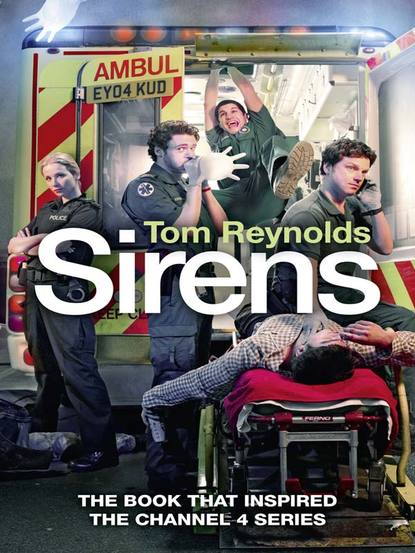По всем вопросам обращайтесь на: info@litportal.ru
(©) 2003-2024.
✖
The Complete Blood, Sweat and Tea
Настройки чтения
Размер шрифта
Высота строк
Поля
ORCON – the biggest problem with the ambulance service, and the biggest cause of staff/management friction. Every so often I will revisit this topic, as it’s of such importance.
I’m single at work at the moment (which means I don’t have anyone to work with – so am sitting on station twiddling my thumbs), so I thought I’d tell you all about the great God ORCON and how he rules the life of every EMT/paramedic in England.
This is really boring, so I’ll not be hurt if you don’t bother reading any further.
The government likes to give everything targets, from school grades, the waiting time for breast cancer referrals to the number of trains on time.
The ambulance service has only one main target to reach, that of ORCON. ORCON was started in 1974 and governs how fast we are expected to respond to ‘Cat A’ calls. (‘Cat A’ calls are our high-priority calls, although because of the way calls are assessed, they are rarely seriously ill patients).
Essentially, for every ‘Cat A’ call in London we have to be there within 8 minutes.
Simple really.
It doesn’t matter what actually happens to the patient, just so long as we get there within 8 minutes. For example, if we get to someone who has been dead for 2 days within 8 minutes, that counts as a Success. If we get to a heart attack in 9 minutes, provide life-saving treatment and ensure that their quality of life is a good as possible it counts as a Failure.
For those who don’t live in London, let’s just say that traffic is often heavy, and there are speed-bumps and tiny side-roads. We have more than 300 languages spoken in London, which may delay getting the location we are needed at. We are hideously overused and understaffed, we face delays at hospital owing to overcrowding and delays on-scene because of the ignorant people we have to attend to.
None of this matters – all that matters is the 8-minute deadline. If we make 75% of all calls in 8 minutes we get more money from the government, which means more staff, vehicles that work etc. … If we don’t make 75% then we don’t get any more money and we continue to struggle. This year it looks like we are going to make it, but only just.
There isn’t any reason behind 8 minutes being the time we need to get to people: brain death occurs after 4 minutes or so; trauma, while needing to be treated as quickly as possible, has the ‘Golden Hour’. The current rumour is that it is how long MPs have to vote when the Division Bell rings in parliament – who knows? No-one I have spoken to has any decent answers.
Well, that should be the last of my posts on the boring ‘day to day’ running of the London Ambulance Service.
You may all rejoice now.
Oh … Bollocks …
Rather obviously this topic dominated my weblog for some time – I’m including only some of it here, because I’m sure that you didn’t want to pay good money to read about me being horribly ill. I haven’t edited this post for this book – it’s much how it originally appeared on my website. I started writing it less than 2 hours after I was exposed.
There is a fear that every health-care worker has. Tonight that fear jumped up and slapped me in the face.
Second job of the shift, we were called to ‘50-year-old male – collapsed in street’. Normally this is someone who is drunk, but we rushed to the scene anyway, just in case it isn’t (we rush to everything – it’s the only way to be sure you are not caught out). We reach the scene and see the male laying on the floor talking gibberish. He is bleeding from a cut on his face and possibly from his jaw. Bystanders tell us that he ‘just dropped’. He then starts to vomit, and because it’s dark we get him on our trolley and into the back of the ambulance.
Our basic assessment finds that he has no muscular tone on his right side, although all his observations are within normal limits. Deciding against hanging around we start transport to hospital. Halfway to hospital he starts to vomit and cough – part of this vomitus/blood flies unerringly across the width of the ambulance …
… right into my open mouth.
Pretty disgusting, but what can you do? The patient then starts to come around, now able to move all limbs and to talk. This is good, it means I’m able to get some history from him. So I get his name, date of birth, address. Then I ask this 50-year-old if he is normally fit and well.
‘No’, he says, ‘I have AIDS (acquired immune-deficiency syndrome)’.
Bollocks.
I’ve never had anything from a patient in my mouth before (apart from the odd chocolate when I was a nurse), so of course the first time is with an HIV (human immunodeficiency virus)-positive patient.
My crewmate looks in the rear view mirror, and that look passes between us. Ambulance people will know what I mean – it’s the ‘Oh shit’ look that you give/get when something goes horribly wrong.
We get to the hospital and the patient is looking a lot better, fully orientated, full strength and starting to feel the pain from a probably busted jaw. So I get to hand over to the nurse, which turned into a bit of a comedy moment …
Me: ‘Patient witnessed collapse, had right-sided hemiparesis, now resolved. Previous history includes AIDS’.
Handover Nurse: ‘Fine’
Charge Nurse: ‘You can’t say that’
Me: ‘Pardon?’
Charge Nurse: ‘You can’t say AIDS – people will be prejudiced against him’
Me: ‘Well they shouldn’t be, and this is medical stuff. It’s a syndrome like any other’
Charge Nurse: ‘You have to call it something else’
Me: ‘I don’t really care for political correctness, besides I’m a patient as well – I swallowed some of his blood’
Charge Nurse: ‘Oh, well … lets get you sorted out then’
I then went through the rigmarole of having blood taken, then I asked to be put on PEP, which the charge nurse agreed I should be put on. PEP is ‘Post Exposure Prophylaxis’ – basically a cocktail of antiretroviral drugs that, taken over a 4-week period, will hopefully reduce any live virus to non-infective amounts. Common side-effects include nausea, vomiting, headache, diarrhoea, cough, abdominal pain/cramps, muscle pain, tiredness, flu-like symptoms, difficulty in sleeping, rash and (I love this one) flatulence.
Other more uncommon side-effects are … pancreatitis, anaemia, neutropenia, peripheral neuropathy, and other ‘metabolic effects’.
I’m in for a barrel of laughs for these next 4 weeks …
The charge nurse looked really sympathetic when he offered me stuff to look after the side-effects – he used to work in an HIV clinic so I guess he knows better than me what I’m in for …
Then we talked about rates of infection, which is why I’m feeling kinda relaxed here. HIV is a tough virus to catch (compared with hepatitis, which is the one that worries me). If I were to stab myself with a needle after drawing HIV-positive blood I would have a 0.004% chance of catching the virus. Swallowing a bit of blood/vomitus is less risky than that, especially as I have no mouth/stomach ulcers. With the PEP my chances of ‘seroconverting’ are as close to zero as you can get. I knew all this before I set foot in the hospital, which probably explained why I wasn’t a quivering wreck.
So far ‘only’ two medical workers have seroconverted after needle-stick injuries. I greatly doubt that I’ll be the third.
So ‘The Plan’ is that I go to see Occupational Health on Monday, and they will advise me on what happens next. I’ve been told already that I’ll have to avoid sexual contact for the next 3 months (not a hardship – I’ve managed ‘no sexual contact’ for 2 years before now) and that I’ll probably need to take 4 weeks off work due to me feeling too ill from the side-effects of the antiretrovirals.
We’ll see about that … I don’t ‘do’ ill.
Anyway, if I do need to take time off it’ll give me a chance to read some books I’ve got sitting on my shelf – and complete ‘Zelda – Windwaker’.
Gotta go now, I feel flatulent already …
I never got around to completing ‘Zelda’.
‘Donor’ Takes on New Meaning
I got a lot of support over the previous post, and to be honest I would have been a lot less calm if I didn’t have my blog where I could offload some of my worries.
First, thanks to everyone who has contacted me over my ‘exposure’, I appreciate it all, even if I haven’t personally replied to you (you’ll find out why I might not have answered you a bit later in this post …).
I went to Occupational Health on Monday, basically to let them know about my exposure, and that I was on PEP. The LAS showed how nice they are by lending me a spare ambulance to drive to my appointment – GPS navigation comes in handy when you don’t know where you are going.
Occupational Health is south of the river at King’s College Hospital, which is a bit of a trek. ‘Occy Health’ took baseline blood samples, so they would know if there was any effect on my liver/kidneys/white cell count, and filled in a couple of forms about my exposure. Then they told me that they would get in contact with the ‘donor’ to see what his virus load and hepatitis status was.






